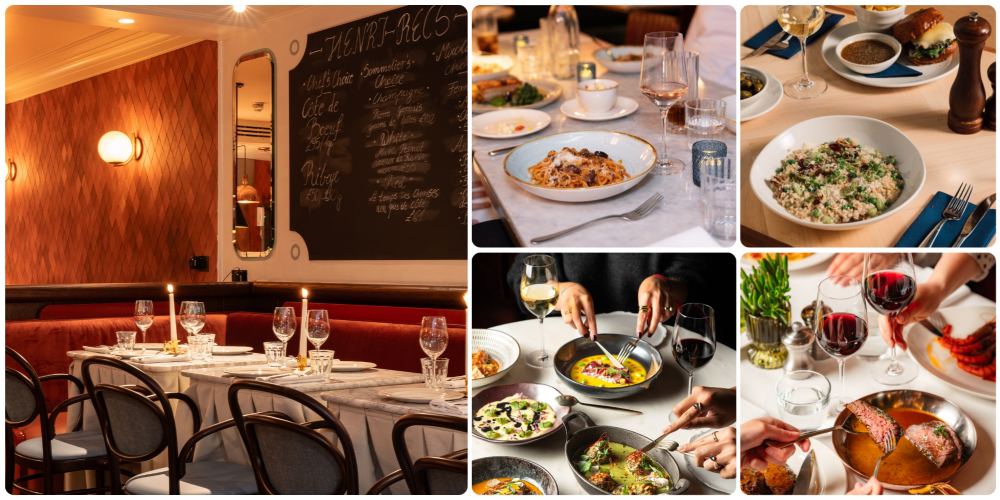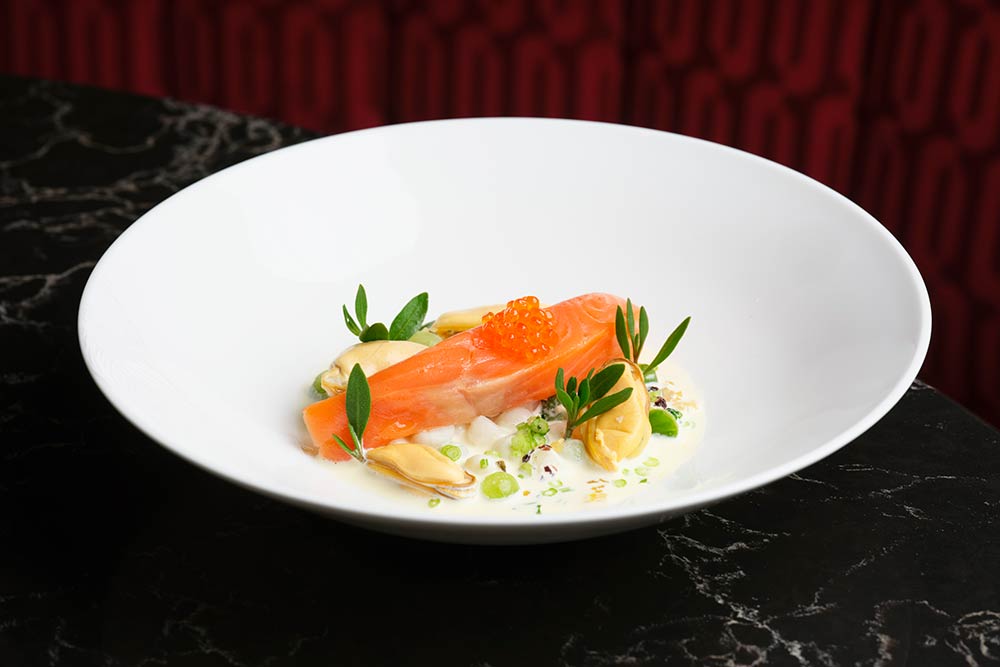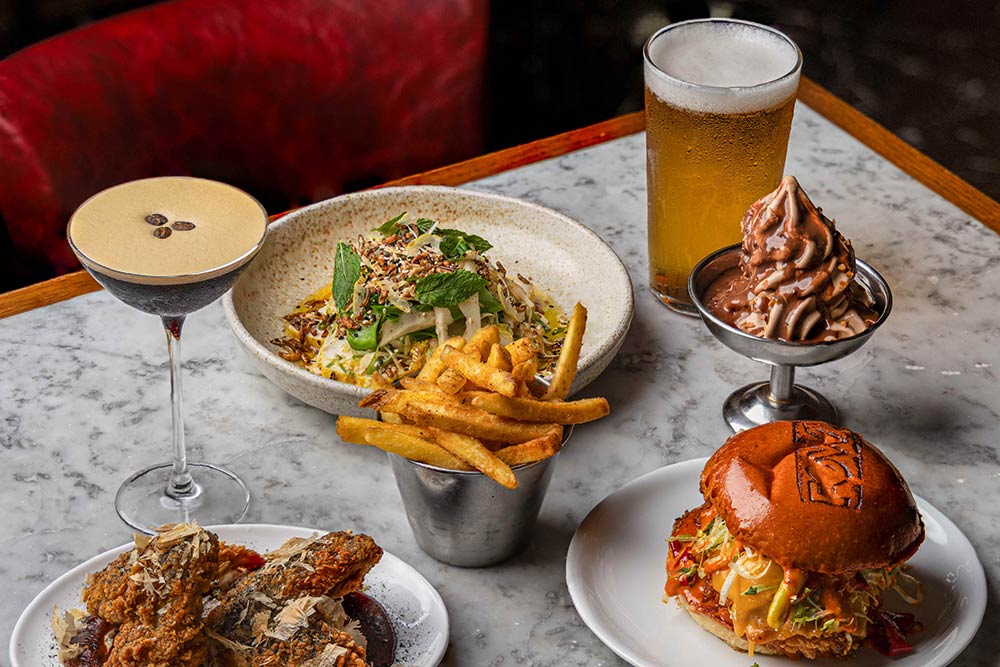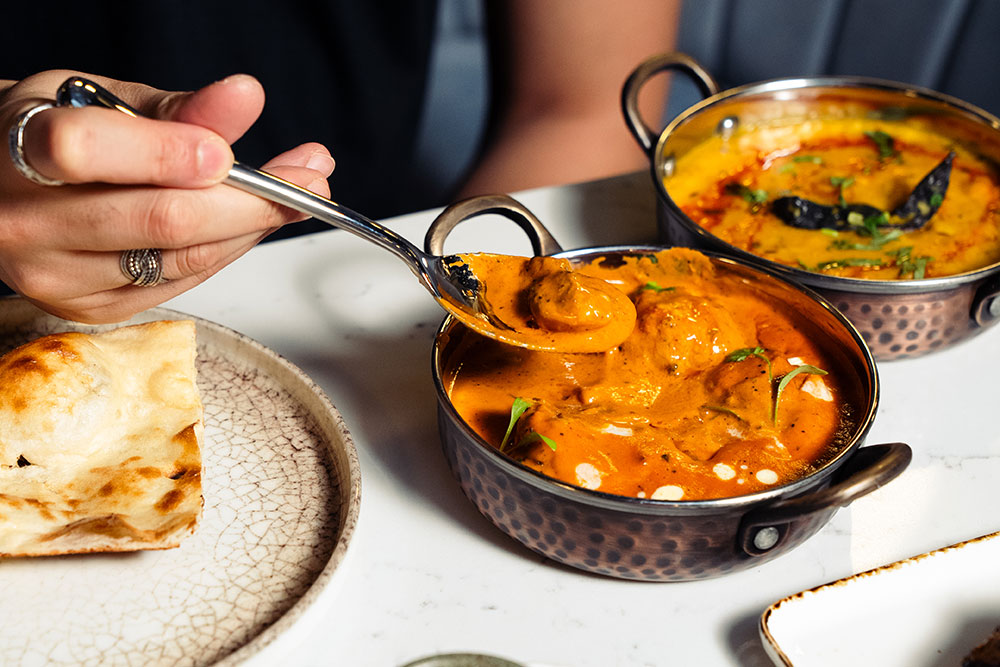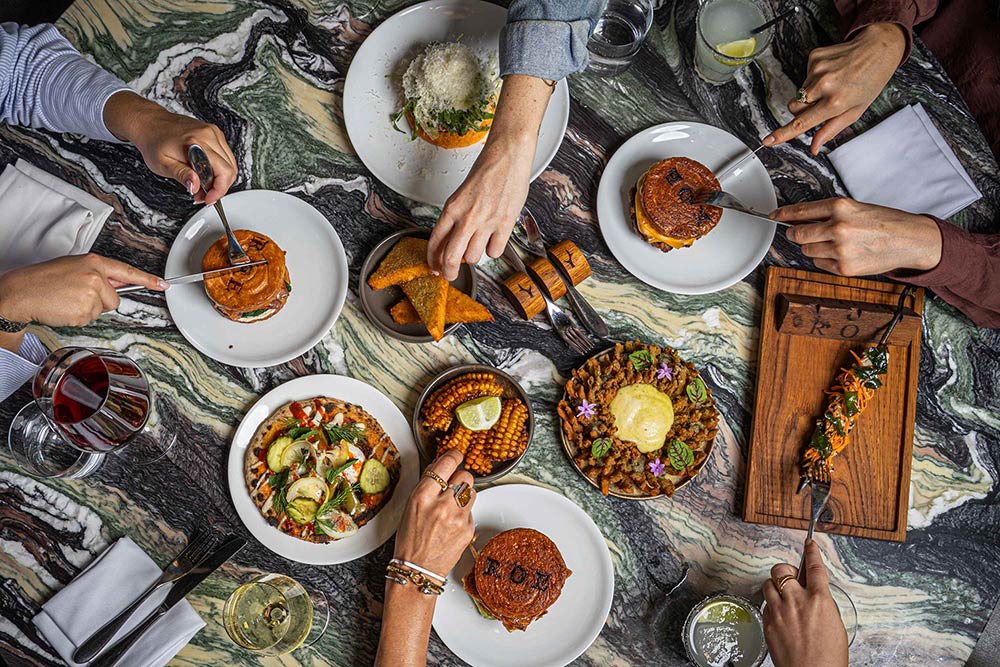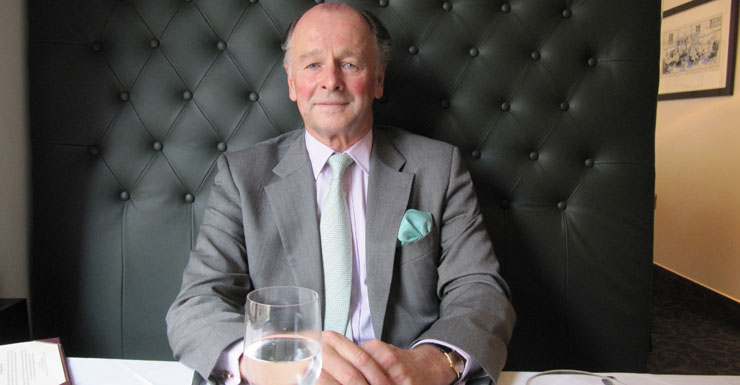
Simon Parker Bowles has been in the London restaurant business for 28 years – more if you count his related time at the high-end wine merchants Justerini and Brooks. As Simon tells it, his father had his career mapped out, but he has made the restaurant business his own, opening Green’s restaurant back in 1982. Last year saw the venture move into the City as part of a new period of empire building. Hot Dinners was invited to lunch with the veteran restaurateur at the new Green’s to hear what he thinks of restaurant reviewers, how London restaurant fashions have changed over the decades and why he’s not impressed with eating out fads.
Hot Dinners: In the interest of open disclosure, it should probably be mentioned that your head chef at Green’s in Duke Street is the sister of Fay Maschler and that you’ve known Fay’s husband since your days together in the Coldstream Guards. So what happened when the Evening Standard came to review the new Green’s?
Simon Parker Bowles: It was actually a coincidence because Fay was away on holiday so her colleague did it. So everyone was happy – we were happy because it was very good, she was happy because she didn’t have to do it.
Do you ever get upset by reviews?
I’ve been around long enough to not worry about reviews one way or the other but I did get pretty upset by the AA Gill review.
I think he has every right to say what he likes, but when you come on the first day - and he says in the article he was in a foul mood, he couldn’t park his car and he obviously wasn’t going to like anything – to be so dismissive of everything that we’ve done and to say something like "I don’t know what the place looked like but it reminded me of an Angus steakhouse in Leipzig", when it’s a beautiful building, can you take it seriously?
You grit your teeth and don’t say anything because it just gives him more oxygen. I mean he’s in the same business I’m in.
Fay says when she goes somewhere early on and she doesn’t think it’s good enough she says, ‘Look, I’m not going to review you, but I will come back in two or three weeks time, so get your act together’ which is fair enough – that’s if they recognise her. If they don’t recognise her, she just comes back another time. To set out to destroy something because you think you’re a funny writer, well it’s the first time I got pissed off.
Do you think his review harmed you?
This restaurant has been enormously successful, from day one, so it didn’t make any difference as it turned out. But it could have. Constructive criticism is useful, but to write the smoked salmon smelt like cat’s piss is really not very professional. The smoked salmon here is extremely good – I’ve been buying it from the same place for 28 years now. We’re known for our smoked salmon.
There’s been a lot of talk about whether critics should review a restaurant the minute it opens – what’s your take on this?
After what I’ve just whinged about – I do think to come on the first Monday we’re open is tough. I don’t think they’re going to get the best impression of what it’s like from that anyway. I think Fay’s attitude is right.
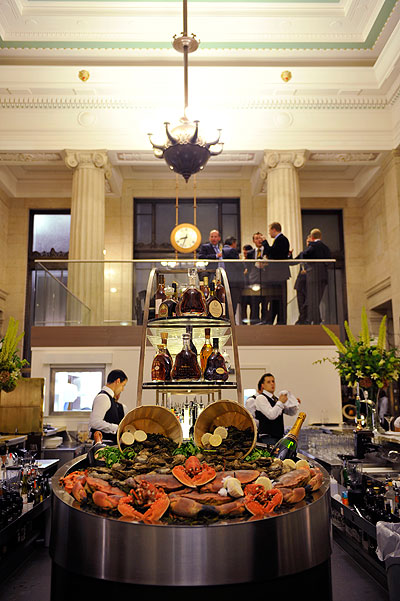 Of course, the internet’s brought in a whole new range and variety of critics.
Of course, the internet’s brought in a whole new range and variety of critics.
The change in the years I’ve been doing it is dramatic. It’s much more in the public face because of television and the likes of Ramsay and so on. It’s become much more of a higher profile business. There are so many more facets of reviewing restaurants – online, in magazines, radio and all those things.
I‘m aware of the necessity of having good vibes about the place, but I didn’t lose any sleep over the AA Gill piece. I think everyone thought I was going to go and shoot myself! My wife hid it from me for about 24 hours. But he’s not the only one. I think there’s a tendency now for people reviewing restaurants to use it as a vehicle to show what wonderful writers they are.
Are you talking about Giles Coren?
You said it. There’s about four or five of them who use about three quarters of their restaurant page to be funny and clever and a quarter to write about the restaurant. I’m not sure how much people react to them. I’m biased because I’ve known her for such a long time, but Fay is totally professional. She’ll add a bit of background, but her whole article is about the restaurant.
Where do you like to eat out in London?
I’m a very bad person to talk about other restaurants. I seriously lunch or dine at my restaurants every lunchtime and probably two or three nights a week. I do go out very occasionally.
It sounds arrogant, but what am I really going to learn? Am I going to copy one of their dishes? I’m not going to learn how to run a restaurant or go poaching staff. People say ‘Oh you must go to this place, it’s had a tremendous write-up, it’s pitch black and you eat by feel’ and I think I wouldn’t go there if you paid me! I think it’s much more important that I be at my restaurant.
[At this point the waitress comes and we place our order. Hot Dinners has the potted shrimps followed by the turbot and crab pancake and Parker Bowles orders the wild mushrooms on toasted brioche with pheasant. We both have the braised lettuce and peas as side orders.]
How did you put your team together for this restaurant?
Michael our chef has proved to be incredibly good and good at doing what I’ve asked him to do. He’s been at Le Gavroche and his last job was at a hotel in Surrey. I’m thrilled with him – he’s a little bit temperamental. He’s French but English, he throws his toys around a little bit, but we manage to control him.
So you think it’s important for the restaurant owner or chef to be in the restaurant?
The trouble with personality-style restaurants is that if the personality isn’t there, some of the value goes. The irony is that the likes of Ramsay have totally abused that situation. They have names associated with 15 restaurants, none of which they’re ever at. They’ve created this empire and if you analyse it, you ask, ‘Why am I going here? Why am I paying £200 for lunch?’ Initially you’re going because it’s a Gordon Ramsay restaurant, but when was the last time Gordon was there? He nearly went under. Look at Tom Aikens – he got it wrong too.
I’m not putting myself in that sort of category but there is a plan in the future to roll out other Greens and hopefully I’ll do a little less. At the moment my wife is telling me I’ve got to slow down, but I’ve never worked so hard in my life.
What made you take on this huge building on Cornhill?
We thought we’d open two new restaurants. We sent out some experts looking for new restaurants and they came back saying this is such a fantastic building – it’s obviously much bigger than we planned to do, but why don’t we do one instead of two? I had reservations, but I was swept away not by my own but by my colleague’s enthusiasm. So the poor old investors said OK.
The major problem architecturally is that it’s a listed building so you have the most horrendous problems. It’s stunning but it’s an almost untouched banking hall. The linoleum on the floor we have to keep, the original black horse mural on the floor, all the old tellers’ cages – all of which are wonderful, but you mustn’t touch that or this.
Did the fact that the building was listed cost you more money?
What was expensive was the inability of English Heritage to have any concept of the importance of time. We would say ‘Can we do that?’ and the chap would say ‘You can’t actually start until it’s gone before the committee meeting in two weeks time.’ Those sorts of delays added a great deal of money to the overall cost.
On the plus side, the building has the added advantage of being commercial – it can be used for film shoots, weddings, fashion shows, premiere parties. So big can be beautiful.
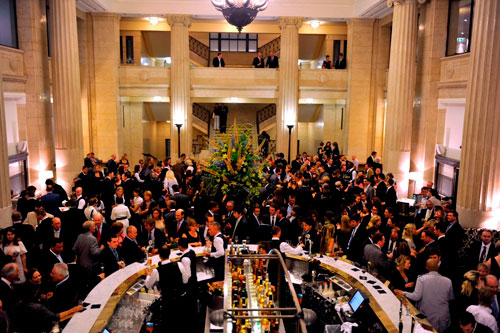 Did you have to tweak the Green’s concept for the city market?
Did you have to tweak the Green’s concept for the city market?
It’s a totally new crowd here. But even at St James although our customers haven’t changed, their habits have.
When we started in the 80s, people would have champagne or a martini before lunch, they’d have three courses, red wine, white wine, port, brandy and cigars. Now they certainly don’t have any drinks before. Sixty per cent won’t have any alcohol at all at lunchtime, lots only have one course. We sell more wine here than in the West End, but they drink better wine in the West End. There’s a culture here of beer and wine in the bar, but at Green’s Duke Street it’s champagne before dinner.
There’s a lot of drinking here in the city five days a week and, I don’t want to sound snobby here, but it’s business we can do without. I have two sons, aged 29 and 31 and they tell me there’s quite a cocktail culture so we now do cocktails [at Green’s Cornhill] which we don’t have in the West End.
Are there any other changes in the culture of eating out you’ve noticed?
A restaurant 30 years ago was really just a place to go to. There wasn’t this fascination with food. Nowadays people are so into cooking. People are now great experts!
In all that time you must have built up a range of great suppliers?
You have to keep one jump ahead of your suppliers. As soon as they think you’re a satisfied, regular customer you get put in that category where the order is fine, but new business gets the best cuts, the best fish. You almost send some back, even when it’s fine just to show you won’t be taken for granted.
It’s a little late in the day, but we’re trying to be better about how it’s sourced, be more environmentally friendly. All I care is that it tastes good. I don’t need a three line description on how the mother and father of the animal were brought up and what it ate and how it ate it. There’s no point pretending you’re something that you’re not. I’m not going to change the habits of the lifetime – I’ll listen if a species of fish is threatened, it’s easy for me not to serve it. I take that very seriously but I’m not a great crusader of all that.
Of course your nephew, food writer Tom Parker Bowles is a passionate believer in seasonality and food sourcing.
I have great admiration for him. I think he’s extremely good at what he does – very knowledgable and he’s in the right place at the right time. He believes in it.
Did your sons not want to follow you into the business?
The eldest son, Neville, was going to. He lives in America, he’s a film producer. My second son thought about it, I think I killed him – he worked as a Commis at The Square which was incredibly hard work and he said he wasn’t sure it was for him. He’s now in the fine art business. [The restaurant business] is a tough business and I don’t think he’s tough enough – he’s too nice.
Would you have wanted them to?
Looking back, I’ve enjoyed it, but it takes over your life more than most jobs, if you’re going to really be serious about it. In the early days I probably had a bit too much to drink...you do get tired and ratty and I barely saw my wife at the beginning.
If you had the chance to go back in time, would you have made any different life choices?
It’s a good question. I would have done it differently and I think I would have done it wrong. I probably would have stayed in the army a bit longer. Being in the army takes over your life too – my brother’s in the army as a professional soldier and his domestic life is quite complicated. He had a wife [Camilla Parker-Bowles] who didn’t particularly want to go abroad if he was going abroad.
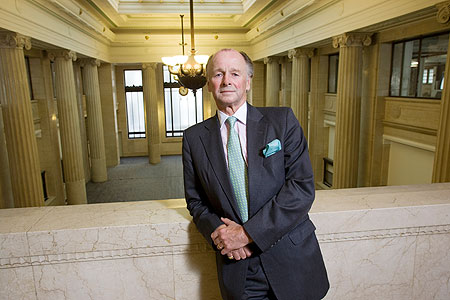 We heard that apparently your father took you aside and told you what your career was going to be – army followed by entering the wine trade.
We heard that apparently your father took you aside and told you what your career was going to be – army followed by entering the wine trade.
He told me this at 16 and you sort of thought in some naive way that everyone else’s fathers were telling them what to do. I didn’t have any other ideas at that time.
When I was about to leave the army and was offered a very exciting ADC [Aide de camp] in Australia he reminded me very strongly that he’d used a friendship to get me the job [at the wine merchants] and that I wasn’t even to think about it! I was 23 - I don’t know why I didn’t stand up for myself a bit more. I sometimes look at my contemporaries who went into the city and are now being paid £10m by Cazenove. The rewards might have been fantastic, but I would have hated that.
In a funny way, the wine business led me to this. I’ve always had a fascination with this industry – the theatre of it. My son’s an actor and there’s a bit of that in me. I saw myself as putting on a play a day and you’re only as good as your last performance. I certainly had that kind of romantic idea at the start but was quickly disillusioned by the practicalities of it.
Anything in particular?
I set up employing a lot of old rogues, they would bring in their favourite customers but they also brought in some extremely dubious business practices. It took me quite a long time to work out why things weren’t going as well as they should.
How do you make money in this industry?
The great myth is that a full restaurant means a profitable restaurant. You have to make sure you’re running it efficiently. Sometimes it’s good to have a downturn, it makes you realise that the money you fritter away in good times is quite dramatic.
Over the last year in the West End our turnover was down, but our bottom line was up because we weren’t taking on extra members of staff every time we thought we were busy. You want quick solutions when you’re very busy and quick solutions aren’t cheap solutions.
You’ve been in this business for years – what have been the biggest changes for you?
When I started in ‘82 in Duke Street, there was Wiltons – who were then in Bury Street - the old Quaglinos, À l'Ecu de France in Jermyn Street and that’s pretty much it in that area. And now there have to be 20 restaurants in that area at least. But the explosion was pre-Hedge funds. One of the big reasons was the change of lifestyle; husbands and wives both working, much less entertaining at home.
[Dessert time and Hot Dinners orders the sticky toffee pudding]
What was the last good meal you ate in London?
The last good meal I really enjoyed was a dinner with my son Sam at Le Caprice. I thought it was just what I wanted. I’m a bit predictable. I was taken to Scott’s which I was pretty impressed by – I thought it was very well run. I went to Philip Howard’s Kitchen W8. We went for a late dinner and I think he’s a wonderful chef – I thought for what it was, it was good.
I used to love Mark’s Club – it seems to have lost its way since the wonderful Bruno, who was its Maitre d’, died. It’s lost something. Bruno was very aware but not intrusive. Some [Maitre d’s] tend to become a little impressed by their own reputation. Cecconi’s when it was run by Cecconi – now he was a nightmare. He’d come and join you and pull up a chair!
Are you still thinking about expanding? We heard you were looking at Canary Wharf?
I think Canary Wharf is still on the agenda. I want to get this one up and running first.
I’m not quite sure about Canary Wharf. Quite like the economy, I’m not sure it’s completely settled down. Maybe I’m being ultra cautious – I do like the area, I think it’s attractive. My plan – and I’m only one of three – would be to have a Green’s in Edinburgh, Glasgow or Chester. I think you can do overkill in London.
That’s down the line, when I’ve taken a slightly more ambassadorial role. I’d be quite like the Queen, visiting my empire – I’d do a progress. I hope we reduce the personality cult enough for it to stand on its own two feet.







